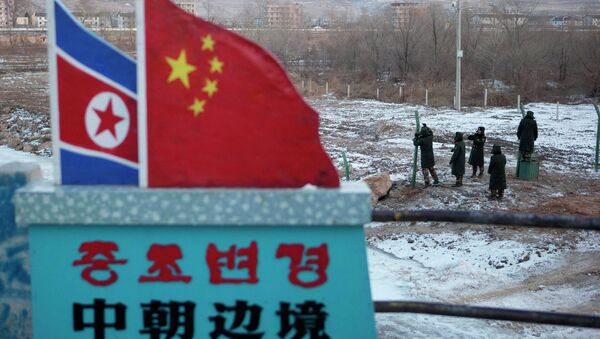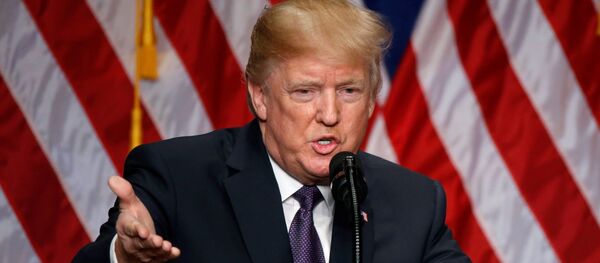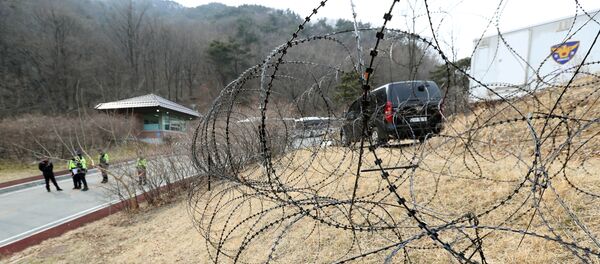Tensions continued to escalate on the Korean Peninsula in 2017, when North Korea and the United States traded harsh rhetoric amid the rapid progress of Pyongyang’s nuclear arms program. But North Korean leader Kim Jong-un made a surprising peace gesture during his televised New Year’s Day speech, expressing his willingness to hold a dialogue with South Korea. Subsequent high-level inter-Korean talks helped ease tensions and led to North Korea preparing to send a delegation to the upcoming Winter Olympics held in Pyeongchang, South Korea.
Political analysts suggested that increasingly tougher economic sanctions against North Korea could have played a role in Pyongyang extending an olive branch, as the North Korean leader also acknowledged "difficult living conditions caused by life-threatening sanctions and containment" in his speech.
READ MORE: China Refuses to Attend Meeting on North Korea, Co-Hosted by US, Canada
China, the largest trade partner of North Korea, voted in support of a series of United Nations Security Council (UNSC) resolutions last year, joining the global community’s efforts in punishing Pyongyang for developing its nuclear arsenal. Beijing implemented bans on imports such as coal, iron ore and lead from North Korea, cutting off a major source of foreign currency revenue for Pyongyang.
A researcher at University of Oxford suggested recently in an op-ed in The Diplomat magazine that China enforcing economic sanctions "does not constitute a terminal breach in the China-North Korea relationship" and the punitive measures against Pyongyang primarily "aim to Beijing’s control over an increasingly unpredictable North Korean regime."
High Cost No Gain
However, Chinese scholars argued that enforcing economic sanctions would not help China improve its influence over North Korea.
"It’s true that relations between China and North Korea deteriorated in recent years. After more than five years in power, Kim Jong-un has yet to visit China and Chinese leaders also never visited Pyongyang. China’s influence over North Korea indeed fell. But it’s not logical to think that sanctions can help improve China’s influence, because Pyongyang showed disgust against such sanctions. North Korea is very angry that China voted in support of the UN resolution on economic sanctions. Implementing sanctions would only reduce China’s influence further," Jin Canrong, a professor in the School of International Studies of Renmin University in Beijing, told Sputnik.
The Chinese academic suggested that Beijing is unlikely to be seeking stronger influence in Pyongyang because such a policy would come with a high cost with little to gain in return.
"The United States has always argued that China is not taking enough responsibility on reining in North Korea. But if China indeed has to resolve the problem, it would mean that we have to offend others, which bring little benefits in return. China would also have to pay a high price for doing this," Jin said.
Low-Risk Silk Road
Compared to the OBOR Initiative, which also serves the goal of boosting China’s image as a global super power, taking the lead on resolving the nuclear crisis on the Korean peninsula would be much more difficult for China to accomplish, the Beijing-based expert suggested.
"The OBOR Initiative comes from China’s domestic economic needs. We have excessive capacity in China in many industries, such as power generation and steel production. If this is handled improperly, it could trigger economic crisis. For China, domestic issue is a big problem. The OBOR Initiative can help boost China’s global influence with minimal risks involved. Even if you face losses in 30 percent of the projects you invest in, it won’t be that big of a problem. In comparison, resolving the nuclear crisis on the Korean peninsula is much more difficult. Even if China can help solve this problem, the benefits are not very obvious," he said.
No Pro-China Government
With a growing number of Chinese scholars expressing concerns over security implications China may face as a result of North Korea’s rapidly progressing nuclear capabilities, some Western experts brought up the idea of China resolving such threats by fostering a new pro-Beijing government in Pyongyang.
In an op-ed published in The Australian newspaper, Bill Emmott, a former editor-in-chief of The Economist and the author of The Fate of the West, suggested that a Chinese invasion or government change through China’s threat could be an opportunity to "make China great again."
READ MORE: China Calls for Restraint Following Adoption of UNSC Resolution on North Korea
However, Chinese scholars argued that despite the nation’s strong ambitions to become a great power, China missed the best opportunity to support a pro-Beijing regime in Pyongyang.
"Cultivating a new pro-Beijing regime in Pyongyang would be the best outcome for China. But the best opportunity had passed a long time ago. The best window occurred when Kim Jong Il [North Korea’s former leader] just passed away and Kim Jong-un just took over. As we Chinese always say, it’s the golden opportunity to support ‘a baby emperor’ when the former emperor just passed away. Any great power would try such a move, but China did not. I don’t know why," Ding Xueliang, a political analyst and a social science professor at the Hong Kong University of Science and Technology, told Sputnik.
The Hong Kong-based scholar also argued that China lacks the technical prowess to pull off such a move today.
"From the technical perspective, China has never done something like this. Beijing doesn’t have the operational readiness today. In comparison, although Russia’s national strength is on the decline in recent years, Moscow has a lot more operational experiences in similar situations in the past 100 years. For a lot of things, you need to try to do it first. Otherwise you’ll never have such experiences," Ding said.
No Impact On Xi’s Legacy
Despite Chinese president Xi’s signature policy being the "great revival" of the nation and boosting China’s image as a great power globally since taking office in late 2012, failing to take the lead on resolving the nuclear crisis on the Korean peninsula would not hurt his legacy, the Hong Kong-based scholar suggested.
The Chinese scholar believes the Chinese leadership’s strategy on North Korea is simply to minimize possible negative impacts on China.
"I don’t think they have a complete and well thought plan on North Korea. They’re just monitoring the progress of the situation on a daily basis and try their best to avoid the worst outcome. They don’t have anything that can help root out this problem. They want to make sure that this situation would not hurt China’s interest. Beijing simply wants to minimize possible damages," he said.
The expert added that he believes China’s ambition to become a great power will stay only in rhetoric until the country demonstrates that it is capable of taking the lead on resolving various crises globally.
The views and opinions expressed by Jin Canrong and Ding Xueliang are those of the experts and do not necessarily reflect those of Sputnik.






